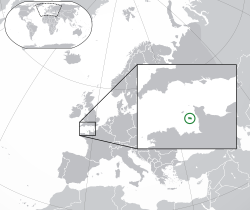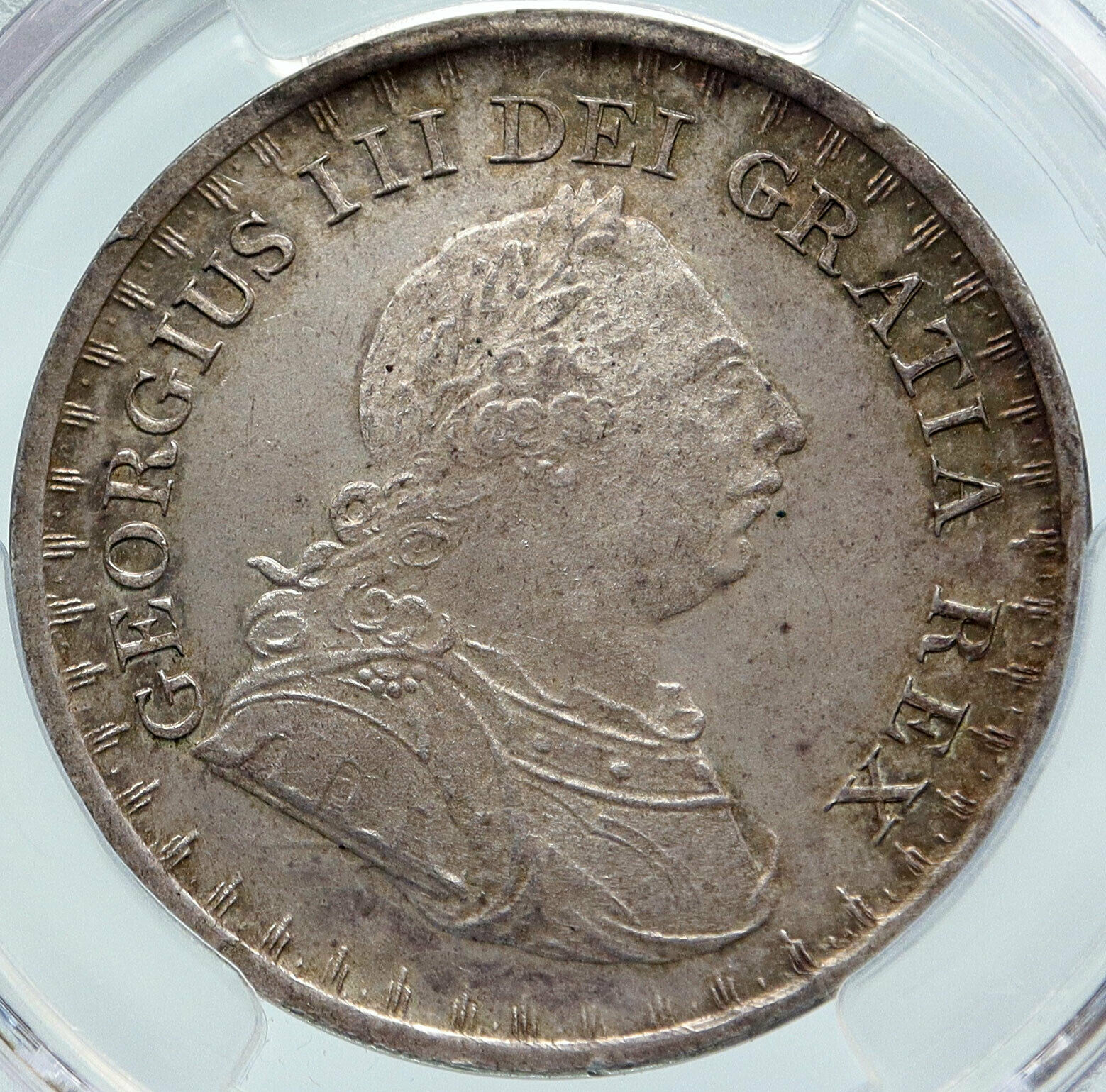|
Jersey – Ruled by UK Queen Victoria (20 June 1837 – 22 January 1901)
1877 Silver 1/24th Shilling 25mm (5.46 grams) 0.835 Silver (0.2953 oz. ASW)
Reference: KM# 7
VICTORIA D.G. BRITANNIAR. REGINA F.D. *, Crowned head left, star below.
STATES OF JERSEY. 18 77 ONE TWENTY-FOURTH OF A SHILLING., Pointed shield (with three lions facing left) divides date.
You are bidding on the exact item pictured, provided with a Certificate of Authenticity and Lifetime Guarantee of Authenticity.
 Victoria (Alexandrina Victoria; 24 May 1819 – 22 January 1901) was Queen of the United Kingdom of Great Britain and Ireland from 20 June 1837 until her death. From 1 May 1876, she had the additional title of Empress of India. Victoria (Alexandrina Victoria; 24 May 1819 – 22 January 1901) was Queen of the United Kingdom of Great Britain and Ireland from 20 June 1837 until her death. From 1 May 1876, she had the additional title of Empress of India.
Victoria was the daughter of Prince Edward, Duke of Kent and Strathearn, the fourth son of King George III. Both the Duke of Kent and King George III died in 1820, and Victoria was raised under close supervision by her German-born mother Princess Victoria of Saxe-Coburg-Saalfeld. She inherited the throne aged 18, after her father’s three elder brothers had all died, leaving no surviving legitimate children. The United Kingdom was already an established constitutional monarchy, in which the sovereign held relatively little direct political power. Privately, Victoria attempted to influence government policy and ministerial appointments; publicly, she became a national icon who was identified with strict standards of personal morality.
Victoria married her first cousin, Prince Albert of Saxe-Coburg and Gotha, in 1840. Their nine children married into royal and noble families across the continent, tying them together and earning her the sobriquet “the grandmother of Europe”. After Albert’s death in 1861, Victoria plunged into deep mourning and avoided public appearances. As a result of her seclusion, republicanism temporarily gained strength, but in the latter half of her reign her popularity recovered. Her Golden and Diamond Jubilees were times of public celebration.
Her reign of 63 years and seven months is known as the Victorian era. It was a period of industrial, cultural, political, scientific, and military change within the United Kingdom, and was marked by a great expansion of the British Empire. She was the last British monarch of the House of Hanover. Her son and successor, Edward VII, belonged to the House of Saxe-Coburg and Gotha, the line of his father.
 Jersey (/ˈdʒɜːrzi/, French: [ʒɛʁzɛ]; Jèrriais: Jèrri IPA: [dʒɛri]), officially the Bailiwick of Jersey (French: Bailliage de Jersey; Jèrriais: Bailliage dé Jèrri), is a Crown dependency located near the coast of Normandy, France. Jersey was part of the Duchy of Normandy, whose dukes went on to become kings of England from 1066. After Normandy was lost by the kings of England in the 13th century, and the ducal title surrendered to France, Jersey and the other Channel Islands remained attached to the English crown. Jersey (/ˈdʒɜːrzi/, French: [ʒɛʁzɛ]; Jèrriais: Jèrri IPA: [dʒɛri]), officially the Bailiwick of Jersey (French: Bailliage de Jersey; Jèrriais: Bailliage dé Jèrri), is a Crown dependency located near the coast of Normandy, France. Jersey was part of the Duchy of Normandy, whose dukes went on to become kings of England from 1066. After Normandy was lost by the kings of England in the 13th century, and the ducal title surrendered to France, Jersey and the other Channel Islands remained attached to the English crown.
 The bailiwick consists of the island of Jersey, the largest of the Channel Islands, along with surrounding uninhabited islands and rocks collectively named Les Dirouilles, Les Écréhous, Les Minquiers, Les Pierres de Lecq, and other reefs. Although the bailiwicks of Jersey and Guernsey are often referred to collectively as the Channel Islands, the “Channel Islands” are not a constitutional or political unit. Jersey has a separate relationship to the Crown from the other Crown dependencies of Guernsey and the Isle of Man, although all are held by the monarch of the United Kingdom. The bailiwick consists of the island of Jersey, the largest of the Channel Islands, along with surrounding uninhabited islands and rocks collectively named Les Dirouilles, Les Écréhous, Les Minquiers, Les Pierres de Lecq, and other reefs. Although the bailiwicks of Jersey and Guernsey are often referred to collectively as the Channel Islands, the “Channel Islands” are not a constitutional or political unit. Jersey has a separate relationship to the Crown from the other Crown dependencies of Guernsey and the Isle of Man, although all are held by the monarch of the United Kingdom.
 Jersey is a self-governing parliamentary democracy under a constitutional monarchy, with its own financial, legal and judicial systems, and the power of self-determination. The Lieutenant Governor on the island is the personal representative of the Queen. It is the second closest of the Channel Islands to France, after Alderney. Jersey is a self-governing parliamentary democracy under a constitutional monarchy, with its own financial, legal and judicial systems, and the power of self-determination. The Lieutenant Governor on the island is the personal representative of the Queen. It is the second closest of the Channel Islands to France, after Alderney.
Jersey is not part of the United Kingdom, and has an international identity separate from that of the UK, but the UK is constitutionally responsible for the defence of Jersey. The definition of United Kingdom in the British Nationality Act 1981 is interpreted as including the UK and the Islands together. The European Commission have confirmed in a written reply to the European Parliament in 2003 that Jersey is within the Union as a European Territory for whose external relationships the UK is responsible. Jersey is not fully part of the European Union but has a special relationship with it, notably being treated as within the European Community for the purposes of free trade in goods.
British cultural influence on the island is evident in its use of English as the main language and the British pound as its primary currency, even if some people still speak the Norman language. Additional cultural commonalities include driving on the left, access to the BBC and ITV regions, a school curriculum following that of England, and the popularity of British sports, including cricket.
|





 Victoria (Alexandrina Victoria; 24 May 1819 – 22 January 1901) was Queen of the United Kingdom of Great Britain and Ireland from 20 June 1837 until her death. From 1 May 1876, she had the additional title of Empress of India.
Victoria (Alexandrina Victoria; 24 May 1819 – 22 January 1901) was Queen of the United Kingdom of Great Britain and Ireland from 20 June 1837 until her death. From 1 May 1876, she had the additional title of Empress of India. Jersey (/ˈdʒɜːrzi/, French: [ʒɛʁzɛ]; Jèrriais: Jèrri IPA: [dʒɛri]), officially the Bailiwick of Jersey (French: Bailliage de Jersey; Jèrriais: Bailliage dé Jèrri), is a Crown dependency located near the coast of Normandy, France. Jersey was part of the Duchy of Normandy, whose dukes went on to become kings of England from 1066. After Normandy was lost by the kings of England in the 13th century, and the ducal title surrendered to France, Jersey and the other Channel Islands remained attached to the English crown.
Jersey (/ˈdʒɜːrzi/, French: [ʒɛʁzɛ]; Jèrriais: Jèrri IPA: [dʒɛri]), officially the Bailiwick of Jersey (French: Bailliage de Jersey; Jèrriais: Bailliage dé Jèrri), is a Crown dependency located near the coast of Normandy, France. Jersey was part of the Duchy of Normandy, whose dukes went on to become kings of England from 1066. After Normandy was lost by the kings of England in the 13th century, and the ducal title surrendered to France, Jersey and the other Channel Islands remained attached to the English crown.  The bailiwick consists of the island of Jersey, the largest of the Channel Islands, along with surrounding uninhabited islands and rocks collectively named Les Dirouilles, Les Écréhous, Les Minquiers, Les Pierres de Lecq, and other reefs. Although the bailiwicks of Jersey and Guernsey are often referred to collectively as the Channel Islands, the “Channel Islands” are not a constitutional or political unit. Jersey has a separate relationship to the Crown from the other Crown dependencies of Guernsey and the Isle of Man, although all are held by the monarch of the United Kingdom.
The bailiwick consists of the island of Jersey, the largest of the Channel Islands, along with surrounding uninhabited islands and rocks collectively named Les Dirouilles, Les Écréhous, Les Minquiers, Les Pierres de Lecq, and other reefs. Although the bailiwicks of Jersey and Guernsey are often referred to collectively as the Channel Islands, the “Channel Islands” are not a constitutional or political unit. Jersey has a separate relationship to the Crown from the other Crown dependencies of Guernsey and the Isle of Man, although all are held by the monarch of the United Kingdom.  Jersey is a self-governing parliamentary democracy under a constitutional monarchy, with its own financial, legal and judicial systems, and the power of self-determination. The Lieutenant Governor on the island is the personal representative of the Queen. It is the second closest of the Channel Islands to France, after Alderney.
Jersey is a self-governing parliamentary democracy under a constitutional monarchy, with its own financial, legal and judicial systems, and the power of self-determination. The Lieutenant Governor on the island is the personal representative of the Queen. It is the second closest of the Channel Islands to France, after Alderney. 




